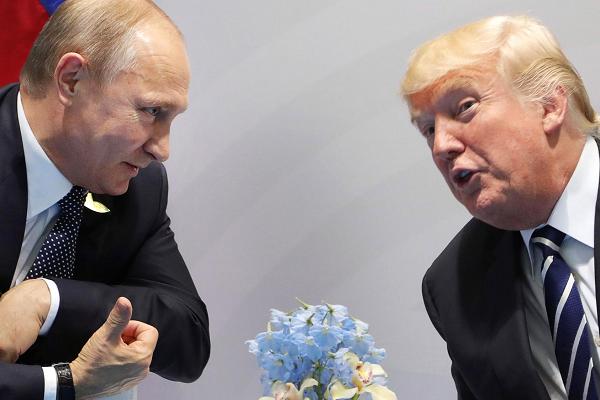
The American Secretary of State, Rex Tillerson met with his Russian counterpart, Sergei Lavrov, a few days ago following the recent imposition of new UN sanctions on Russia. Nevertheless, instead of closing the door on its relations with Russia, Tillerson promised to deal pragmatically with Moscow – whatever that may mean. Perhaps similar to a current popular bon-mots about Brexit, ‘having one’s cake and eating it’ springs to mind.
My ‘take of the week’ this week, has to be this wonderful quote in a Russian newspaper (thanks to Steven Rosenberg, the Russia correspondent at the BBC), reporting that “we drank champagne in vain” expecting that a Trump Presidency would significantly improve relations with Russia because of Trump’s frequent promises during the campaign about his readiness to do business with President Putin. Trump’s win sparked celebrations last year in Russia at least among the elite, the powerful oligarchs were overjoyed but now they realise that their hopes have been dashed. Recall that in the American Presidential Election, Hillary Clinton took a particularly hardline view on Russia and its activities for undoubtedly sound reasons bearing in mind she served as Secretary of State in the first term of President Obama’s Administration and therefore had occasion to look Putin in the eye.
Clinton was seen in Moscow as a threat to Putin’s power base because she evidently planned to use Russia’s 2011 Presidential election to overthrow Putin’s regime. A tit-for-tat maybe since Clinton suspected that Russia was actively supporting Trump in the election through the myriad uses of the dark web. Not only did Russia expect Obama era sanctions be lifted under a Trump administration but Russian properties in the U.S. were to be requisitioned. But quite the reverse has happened thanks principally to the U.S. Congress and less to President Trump’s enthusiasm though he did eventually sign the sanctions bill. These new measures are more stringent than anything imposed up till now. The credit ratings agency, Moodys, warns that these new measures will result in an increase in capital flight, a rise in inflation and a weak rouble.
Under President Putin’s political heft, the Kremlin approach seems to be borne of a Darwinian fight for survival, an existential threat which explains why Moscow stands out as one of the world’s most unpredictable actors, according to Maxim Trudolyubov in the New York Times. Bear in mind that Russian military intervention in Syria is less about Syria, but more about Russia’s opposition to the West. Proxy wars are Russia’s fallback option in dealing with any perceived threat either real or imagined – think about the Cuban Missile Crisis. These new sanctions will have a crippling effect on the economy not least since Russia is already suffering from chronic underinvestment in infrastructure. Ultimately the heavy burden will fall on the Russian people and its neighbours because “uncertainty means punishingly expensive military spending and rising threats to peace and prosperity” according to Trudolyubov.
To be sure, any new American Administration of whatever hue, Democrat or Republican, is expected to be even more hostile to Russia than was previously the case. In Russia’s view this likely scenario is attributed to the ‘Russophobic hysteria currently gripping America’ as reported by Rosenberg.
Over the coming months I expect there to be a lot more clarity about Russia’s alleged interference in the 2016 American Presidential Election as Special Counsel Mueller’s inquiry picks up the pace. One of the main allegations against Russia is that Putin’s priority is to generate instability in the West and among Western allies (President Macron believes that Russia attempted to interfere in the French election alongside its support of Le Pen). President Putin’s ultimate goal may be the re-creation of the old USSR superpower hence Russia’s encroachment into Ukraine and Crimea. Neighbouring autonomous states are justifiably nervous particularly those leaning towards NATO or those seeking European Union membership. Not wishing to muddy the waters further but it is hard to avoid the question, what is Russia’s involvement in North Korea if any?
I hesitate to throw shade on the Tweeter in Chief but there are evidently numerous conflicting demands on the President both political and personal so it would be impossible to predict six months ahead what the state of the world will be. Earlier this year, the historian Francis Fukuyama called America ‘the failed state’ suggesting that its political rot is infecting the world order and equating it to the collapse of the Soviet Union. Fukuyama pulls no punches suggesting that the Trump presidency finally buries any claim of U.S. political leadership and although America’ military, economic and technical preponderance remain intact, it makes no apology for pursuing its own self-interests. He posits this question – will future historians find themselves looking back with nostalgia to the 20th century? Unseemly perhaps. Although, I can recall not that long ago in response to a question from my children that it was most unlikely, nay impossible, there would be a major conflict during my lifetime or even theirs. I so wish I still had that confidence.
9 August 2017